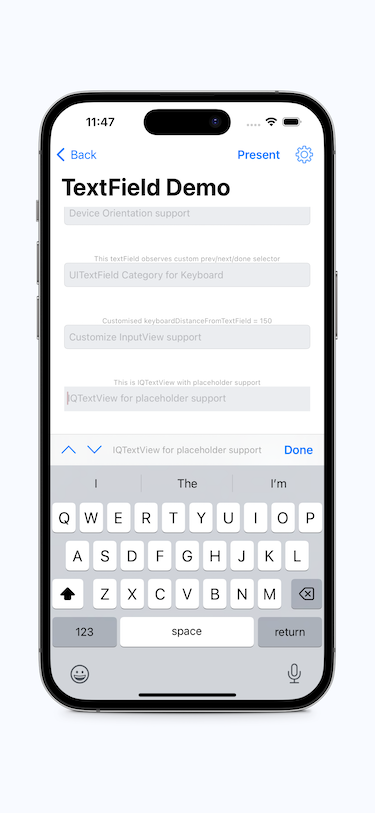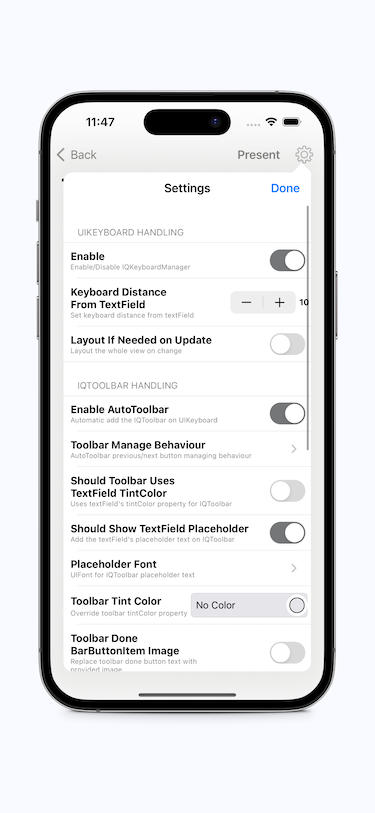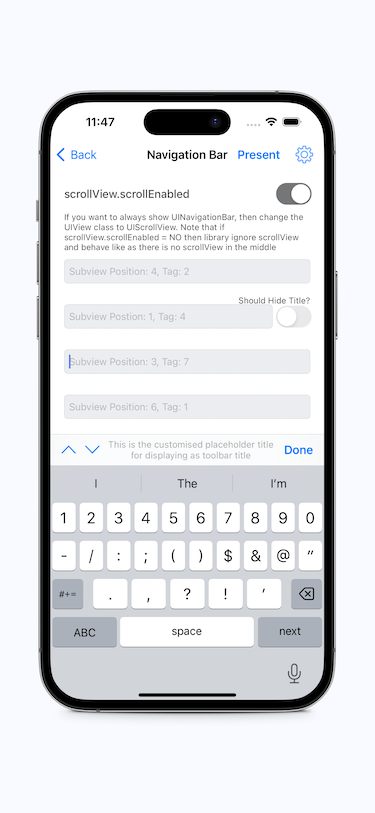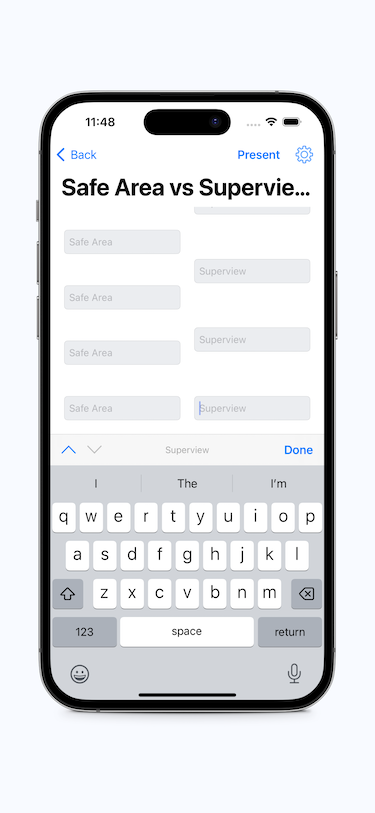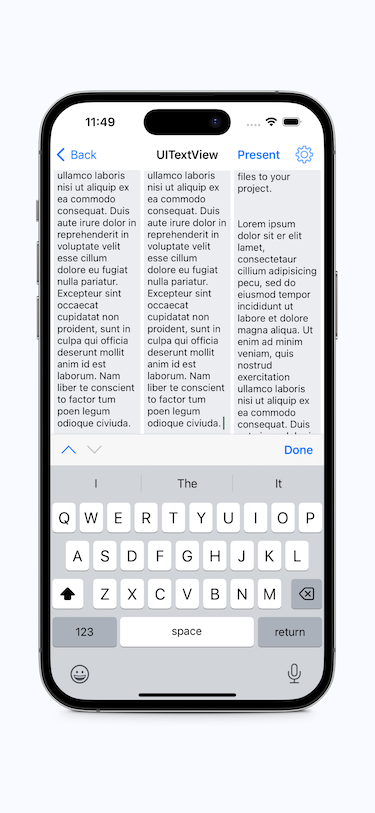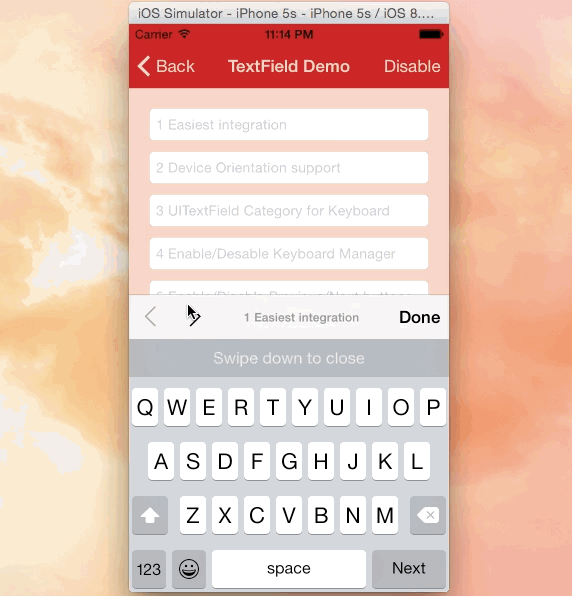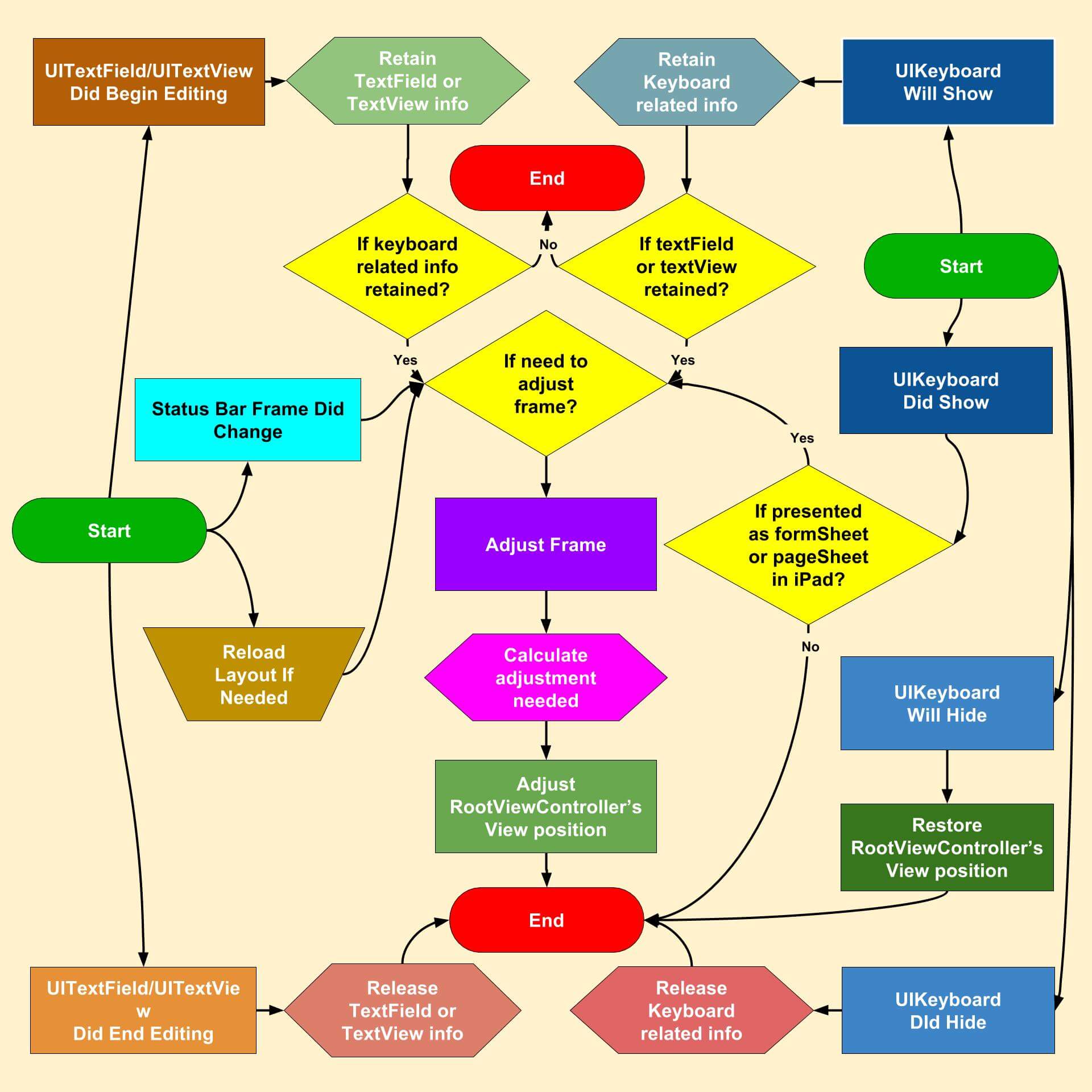It's been 12 years since it's first release in 2013. The library has grown a lot and we have added many new features since then.
Recently while working on bug fixes, I realized that in 2013 there were only 2 files IQKeyboardManager.{h,m} in Objective-C version, while now in Swift version there were 50+ files (version 7.x.x) which makes the debugging a lot difficult than before. Also, some of the features are rarely used in apps.
I realized that some of the features are not tightly linked to each other and can be moved out of the library easily. For Example:-
IQTextViewclassIQKeyboardListenerclassIQTextFieldViewListenerclassIQReturnKeyHandlerclass- Toolbar related features like
IQToolbarandIQBarButtonItemand their support classes. - ...
Moving above things out will make the library more lightweight and user can plug in/out features as per their needs.
I had decided to move loosely linked features out, and publish them to their separate github repo, and use them as dependencies as per requirements.
- Published IQKeyboardCore
- This contains necessary classes and functions to be used by
IQKeyboardManagerrelated libraries. Please note that you shouldn't directly install this as dependency - Published IQTextView
- This is purely separated a separate library now.
- This is usually used for showing placeholder in
UITextView. - Published IQKeyboardReturnManager
- This is a renamed of
IQReturnKeyHandler. This is also separated from the library and can be used independently. - This depends on
IQKeyboardCoreforTextInputViewtype confirmation. - Published IQTextInputViewNotification
- This is a renamed of
IQTextFieldViewListener. This can be used independently to subscribe/unsubscribe forUITextView/UITextFieldbeginEditing/endEditing events. - This depends on the
IQKeyboardCoreto add some additional customized features forUITextView/UITextField. - Published IQKeyboardToolbar
- This contains toolbar related classes like
IQKeyboardToolbar,IQBarButtonItem,IQTitleBarButtonItems, their configuration classes and other useful functions to add toolbar in keyboard. This can be used independently to add toolbar in keyboard. - This depends on the
IQKeyboardCoreto add some additional customized features forUITextView/UITextField. - Published IQKeyboardToolbarManager
- This is something similar to
IQKeyboardManager. This has been moved out of the library as a huge update. - This depends on the
IQTextInputViewNotificationto know which textField is currently in focus. - This depends on the
IQKeyboardToolbarto add/remove toolbars over keyboard. - Published IQKeyboardNotification
- This is a renamed of
IQKeyboardListener. This can be used independently to subscribe/unsubscribe for keyboard events. - Published IQKeyboardManager 7.2.0 for all the current support without any compilation error but by deprecating most of the things which are moved out of the library.
- This now only contains functions for handling distance between
UITextView/UITextFieldand their useful functions. - This depends on the
IQKeyboardNotificationto get keyboard notification callbacks. - This depends on the
IQTextInputViewNotificationto know which textField is currently in focus. - Now there are subspecs support since 7.2.0.
IQKeyboardManagerSwift/AppearanceIQKeyboardManagerSwift/IQKeyboardReturnManagerIQKeyboardManagerSwift/IQKeyboardToolbarManagerIQKeyboardManagerSwift/IQTextViewIQKeyboardManagerSwift/Resign- Published IQKeyboardManager 8.0.0 by marking deprecated classes as unavailable.
- In this release, we removed deprecated classes and marking some of them as unavailable for easier migration.
- Bug fixes which may have arrived due to the library segregation.
- We need your support on this one.
While developing iOS apps, we often run into issues where the iPhone keyboard slides up and covers the UITextField/UITextView. IQKeyboardManager allows you to prevent this issue of keyboard sliding up and covering UITextField/UITextView without needing you to write any code or make any additional setup. To use IQKeyboardManager you simply need to add source files to your project.
-
One Lines of Code -
Works Automatically -
No More UIScrollView -
No More Subclasses -
No More Manual Work -
No More #imports
IQKeyboardManager works on all orientations, and with the toolbar. It also has nice optional features allowing you to customize the distance from the text field, behavior of previous, next and done buttons in the keyboard toolbar, play sound when the user navigates through the form and more.
Tutorial video by @rebeloper (#1135)
@rebeloper demonstrated two videos on how to implement IQKeyboardManager at it's core:
https://www.youtube.com/playlist?list=PL_csAAO9PQ8aTL87XnueOXi3RpWE2m_8v
- If you're planning to build SDK/library/framework and want to handle UITextField/UITextView with IQKeyboardManager then you're totally going the wrong way. I would never suggest to add IQKeyboardManager as dependency/adding/shipping with any third-party library. Instead of adding IQKeyboardManager you should implement your own solution to achieve same kind of results. IQKeyboardManager is totally designed for projects to help developers for their convenience, it's not designed for adding/dependency/shipping with any third-party library, because doing this could block adoption by other developers for their projects as well (who are not using IQKeyboardManager and have implemented their custom solution to handle UITextField/UITextView in the project).
- If IQKeyboardManager conflicts with other third-party library, then it's developer responsibility to enable/disable IQKeyboardManager when presenting/dismissing third-party library UI. Third-party libraries are not responsible to handle IQKeyboardManager.
| Language | Minimum iOS Target | Minimum Xcode Version | |
|---|---|---|---|
| IQKeyboardManager | Obj-C | iOS 13.0 | Xcode 13 |
| IQKeyboardManagerSwift | Swift | iOS 13.0 | Xcode 13 |
| Demo Project | Xcode 15 |
| Swift | Xcode | IQKeyboardManagerSwift |
|---|---|---|
| 5.9, 5.8, 5.7 | 16 | >= 7.0.0 |
| 5.9, 5.8, 5.7, 5.6 | 15 | >= 7.0.0 |
| 5.5, 5.4, 5.3, 5.2, 5.1, 5.0, 4.2 | 11 | >= 6.5.7 |
| 5.1, 5.0, 4.2, 4.0, 3.2, 3.0 | 11 | >= 6.5.0 |
| 5.0,4.2, 4.0, 3.2, 3.0 | 10.2 | >= 6.2.1 |
| 4.2, 4.0, 3.2, 3.0 | 10.0 | >= 6.0.4 |
| 4.0, 3.2, 3.0 | 9.0 | 5.0.0 |
IQKeyboardManager (Objective-C): To install it, simply add the following line to your Podfile: (#9)
pod 'IQKeyboardManager' #iOS13 and laterIQKeyboardManager (Swift): To install it, simply add the following line to your Podfile: (#236)
pod 'IQKeyboardManagerSwift'Or you can choose the version you need based on Swift support table from Requirements
pod 'IQKeyboardManagerSwift', '8.0.0'To integrate IQKeyboardManger or IQKeyboardManagerSwift into your Xcode project using Carthage, add the following line to your Cartfile:
github "hackiftekhar/IQKeyboardManager"
Run carthage update --use-xcframeworks to build the frameworks and drag the appropriate framework (IQKeyboardManager.xcframework or IQKeyboardManagerSwift.xcframework) into your Xcode project based on your need. Make sure to add only one framework, not both.
To install IQKeyboardManagerSwift package via Xcode
- Go to File -> Swift Packages -> Add Package Dependency...
- Then search for https://github.com/hackiftekhar/IQKeyboardManager.git
- And choose the version you want
IQKeyboardManager (Objective-C): Just drag and drop IQKeyboardManager directory from demo project to your project. That's it.
IQKeyboardManager (Swift): Source code installation is not supported (since 7.2.0) because now the library depends on some other independent libraries. Due to this you may face compilation issues.
In AppDelegate.swift, just import IQKeyboardManagerSwift framework and enable IQKeyboardManager.
import IQKeyboardManagerSwift
@UIApplicationMain
class AppDelegate: UIResponder, UIApplicationDelegate {
var window: UIWindow?
func application(_ application: UIApplication, didFinishLaunchingWithOptions launchOptions: [UIApplication.LaunchOptionsKey: Any]?) -> Bool {
IQKeyboardManager.shared.isEnabled = true
return true
}
}If you would like to see detailed Flow diagram then check Detailed Flow Diagram.
Distributed under the MIT License.
Any contribution is more than welcome! You can contribute through pull requests and issues on GitHub.
If you wish to contact me, email at: [email protected]





